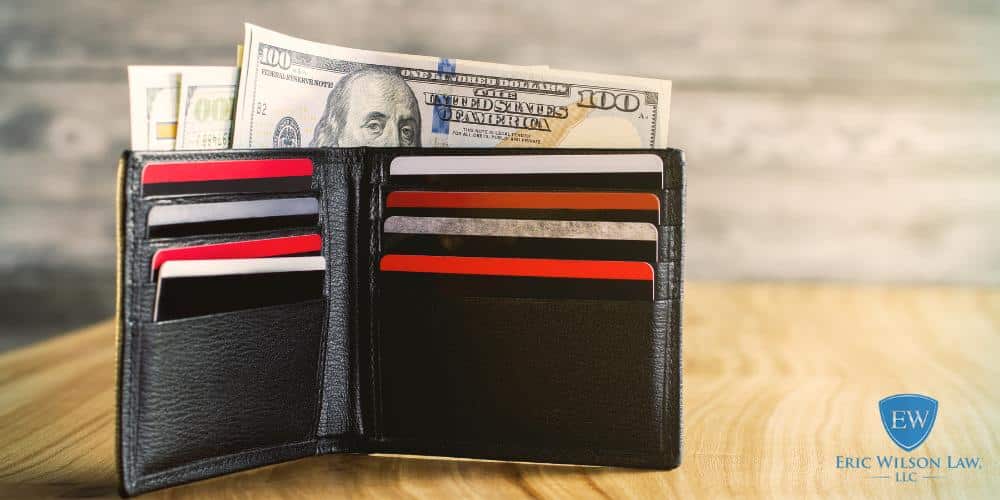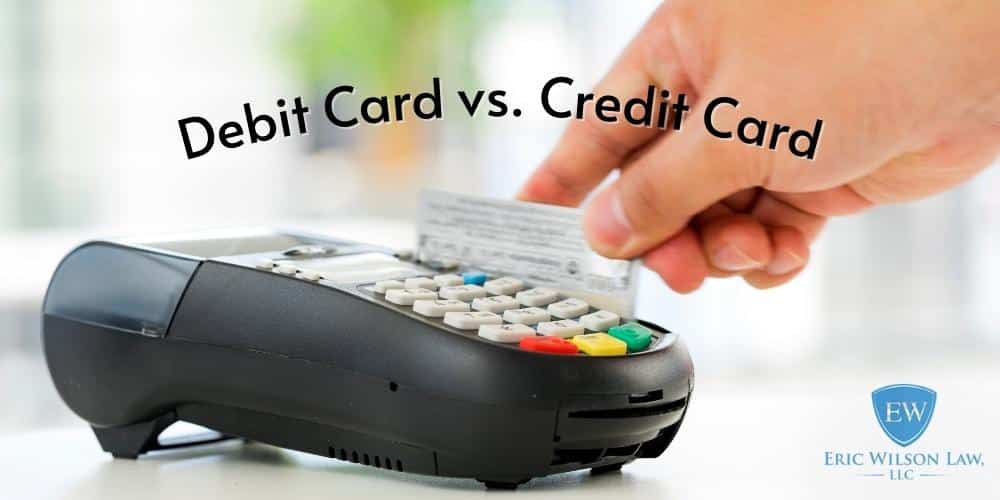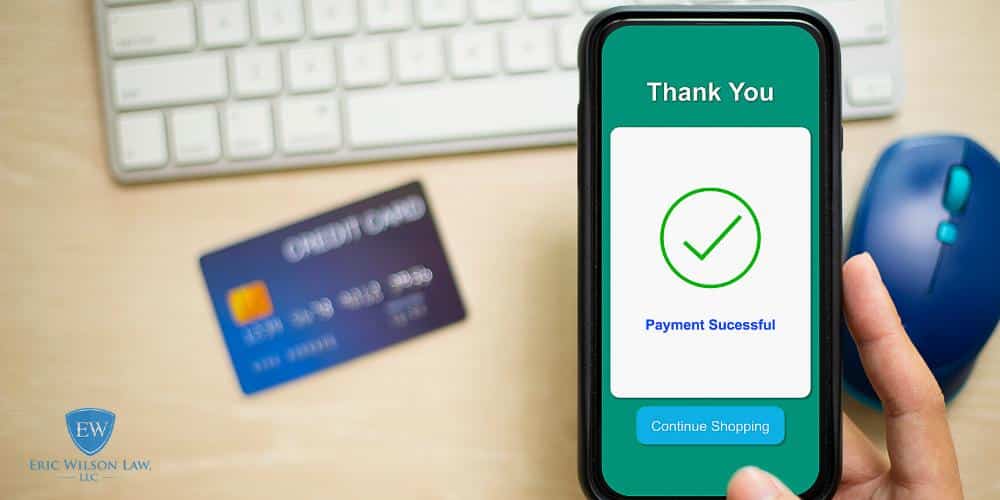Managing personal finances and building credit is incredibly overwhelming, especially if you’re doing it for the first time. Debit and credit cards are crucial tools for making purchases and managing money. But what’s the difference between the two payment methods? Which one is good for building credit? And which one has the best fraud protection? Below, the legal team at Eric Wilson Law discusses debit card vs. credit card and which one is best for you and your financial situation.
If you need guidance on credit card debt and building credit, you have come to the right place. Eric Wilson is passionate about helping his clients achieve a life of financial freedom. Call 205-349-1280 to schedule a free consultation today.
What is a Debit Card?
A debit card is a type of payment card – that’s issued by a bank – that pulls actual money directly out of your checking account or savings account. So if you don’t have enough money in your account, you can’t buy anything. In this way, debit cards function exactly like an old fashion check, except it’s way easier and quicker. Debit cards typically allow you to withdraw cash at any ATM and also require a personal identification number (PIN) before use.
It’s important to note that there is a difference between regular debit cards and prepaid debit cards. You can get a regular debit card when you open a debit account at a bank. Think of prepaid cards as those Visa gift cards. They are not connected to anyone’s bank account, and people usually get them as gifts for other people. People will buy these cards at a convenient store, tell the clerk how much money to load on the card, and then that amount of money will be loaded onto the card. Prepaid cards truly feel like the definition of “free money.”
What is a Credit Card?
A credit card is a type of payment card that allows you to borrow money from a credit card company every single time you make a purchase. Credit card purchases have no immediate effect on your bank account, meaning the card doesn’t automatically withdraw money from your account like debit cards do. But that doesn’t mean that credit cards are free money. You will have to pay all the money back at some point, usually at the end of the month. If you don’t pay at least a minimum payment every month, you will have to pay interest which – depending on the rate – can get really expensive really quick.
Similarly to debit card users, credit card users can also make cash withdrawals, except they are called “cash advances.” Unlike debit cards, though, you can’t just get whatever credit card you want whenever you want. You have to apply for the credit cards you want. If credit card companies think you are financially responsible based on your credit score and credit report, then you will be approved. If you have good credit, you will likely receive a high credit limit. If you have poor credit, you will likely have a low credit limit.
Lastly, if you use a credit card responsibly, you can get a variety of rewards like points, miles, and cash back. With these rewards, you can save money on flights, merchandise, and so much more.
Debit Card Pros and Cons
Debit cards are a great option, depending on what your personal financial goals are. Below, we list the pros and cons of debit cards to help you decide if this type of payment card is right for you.
Pros
- Debit cards are far quicker and easier to use than writing a check.
- A debit card allows you to make cash withdrawals from an ATM or from everyday purchases at the store.
- There are no annual fees.
- Debit cards can help you save money and become more financially responsible because the money is coming out of your checking account immediately. If you know you don’t have enough money in your checking account, you won’t spend money when you don’t need to.
- There are no interest charges.
Cons
- Debit cards come with very limited fraud protection, especially when it comes to online purchases. So if someone steals your debit card and makes a bunch of fraudulent charges, then that money is coming directly out of your checking account, and it’s harder to get it back. Also, if you notify your bank about the fraudulent purchases within a specific amount of time, you could be responsible for up to $500 of the purchases according to the Federal Trade Commission (FTC).
- If you don’t have enough money in your bank account to buy something, then you can’t buy anything. This can really put you in a bind if an emergency happens.
- You could face overdraft fees if your debit card purchases equal more than what is currently in your bank account. You can prevent these fees by disabling overdraft protection, but that means your card will be declined at the store if you try to spend more money than you have. Again, this could put you in a bind in the event of an emergency.
- A debit card doesn’t contribute to credit history or credit scores at all because it’s not a credit line. In other words, you’re not borrowing money, you’re just spending your own money.
Credit Card Pros and Cons
When credit cards are used responsibly, they come with a variety of rewards and credit score boosts. Still, credit cards can have their fair share of consequences too. Below, we list the biggest credit card advantages and disadvantages.
Pros
- Credit cards are great for online shopping, large purchases, and emergency situations. The generally high credit limit allows you to make big purchases without wondering if you have enough money in your checking account
- Credit cards are great for credit history and credit scores, as long as you use them responsibly. In fact, payment history makes up approximately 35% of your credit score. So if you continuously borrow money and pay it back every month, you can build credit pretty quickly. As we all know, having a good credit score is crucial for obtaining car loans, mortgage loans, personal loans, and other credit cards.
- Credit cards allow you to earn rewards like miles, points, and cash back every time you spend money.
- Credit cards offer far better fraud protection than debit cards. Firstly, if someone steals your credit card and makes unauthorized purchases, they won’t have direct access to your bank account. Secondly, the Fair Credit Billing Act caps your liability for the unauthorized charges at $50.
Cons
- The fact that payment history accounts for a large portion of your credit score is both a good and a bad thing at times. Credit cards can definitely ruin your credit if you consistently overspend or if you have back-to-back emergency expenses, especially if you don’t pay your credit card bill in a timely manner.
- If you have poor credit, you could struggle to qualify for another card from another credit card issuer.
- It’s way easier to spend more money than you can afford because the card isn’t pulling money directly out of your bank account.
- If you don’t pay off your credit card in full every single month, you will get hit with interest charges between 13% to 20% on the remaining balance. This can get you in a vicious cycle of credit card debt for several months or years.
- If you miss a credit card payment entirely, you could face a large fee. On top of being charged interest, this could be devastating to your finances.
The Key Differences Between a Debit Card and a Credit Card
The first key difference between a credit card and a debit card is that with the former, you’re borrowing money, and with the latter, you’re spending your own money. Another way to look at it is this: do you want to pay now or later?
The second key difference is that a debit card has absolutely no impact on your credit, while a credit card can really make or break your credit.
What Should I Use: a Debit Card or a Credit Card?
The answer to this question is entirely up to you and your financial goals. Both types of payment cards have their own advantages and disadvantages for sure.
If you’re a compulsive over spender, you’re struggling to control your debt, and you want to avoid paying interest, you should use a debit card at least until you can create better spending habits. This doesn’t mean you should close all your credit cards and stop using them entirely. Keep your credit cards in the back of a drawer – so that you can keep that credit history – and only use them if you need to make a large, necessary purchase. Even doing this for a few months can make a huge difference in your finances.
On the other hand: if you’re trying to build credit, you’re frugal with your purchases, and you’re not drowning in debt, use a credit card. If all of these things are true about you, then credit cards can only benefit you.

Call a Tuscaloosa Bankruptcy Lawyer at Eric Wilson Law Today
Financial planning and budgeting can easily get overwhelming, especially if you’re already struggling with credit card debt, medical debt, student loan debt, tax debt, you name it. That’s why it’s crucial to speak to a professional like Eric Wilson. He can analyze your financial situation without judgment and help you find the best solution. If you’re ready to live a debt free life, call 205-349-1280 to schedule a free consultation at Eric Wilson Law today.



